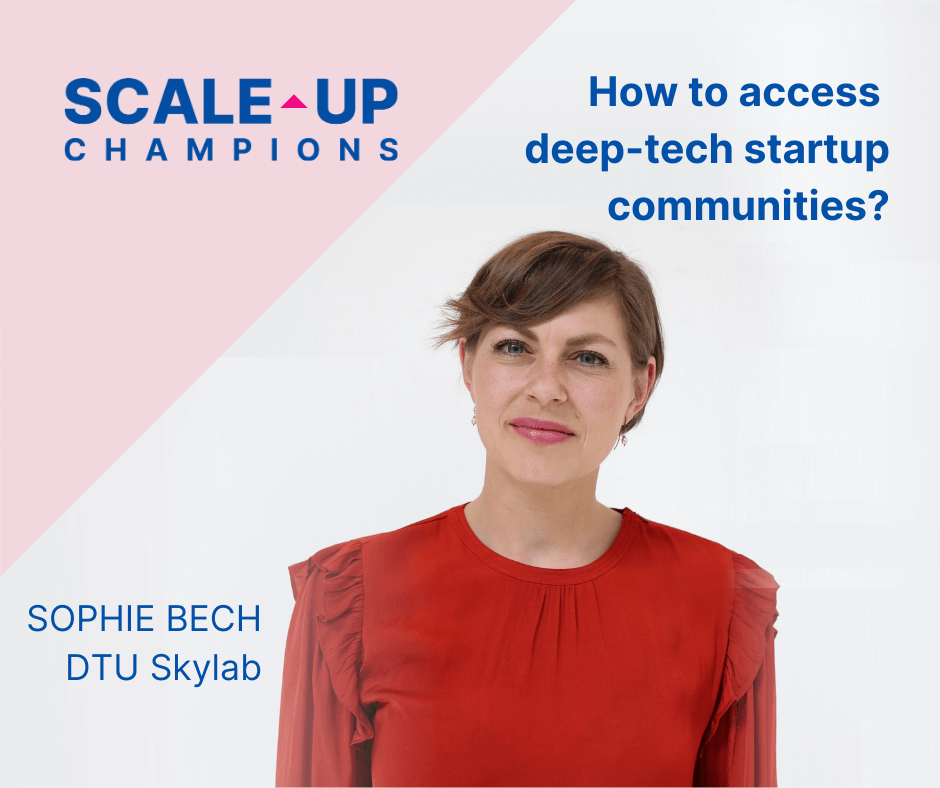A new challenging year has started. Yet it brings new horizons for those entrepreneurs fighting hard to keep their businesses growing and glowing. Coming from an immersive and expanding technical university – DTU Skylab incubator in Copenhagen, startup consultant and innovation expert Sophie Bech shares her thoughts on a specific, however, promising deep tech sector. The expert also engages in the activities of European deeptech community called Scale-up Champions.
Pandemic restrictions made it crystal clear that we need social relations more than ever. Same goes for business and entrepreneurship. What are the biggest hopes for 2021 for the startups, engaging in virtual activities at DTU Skylab?
Our scaling startups focus on preparations for the next chapters, mainly to attract the needed funding or expanding product line. They are eager to know what would be the next steps/action point and step-in fully prepared. Startups want to align with upcoming opportunities form Covid-19 response funds and calls. Due to the Pandemic and various restrictions of physical activities, some of the startups cannot develop their prototypes as planned, they have to use the potential of collaborating with other companies. This is not an easy task – deep tech sector has its own pros and cons. Deep tech businesses cannot adjust to the changes immediately, they are dependent on scientific input and long-term researches as well as physical equipment. For instance, if you develop a green tech solution for purification of polluted water, you need to test every adjustment. That requires laboratories as well as human resources.
We as startup support organization and community have had to rewire our activities and made them all happening virtually. It is a convenient way to continue our interconnections and efforts to build and sustain innovation communities. So there are options and tools such as online Scale-up Champions Startup Ecosystem Guide, that helps to figure out the local support hubs for 5 booming ecosystems in the EU: Denmark, Poland, Estonia, Spain and Lithuania.
What matters the most expanding businesses in foreign markets?
Well, the first issue is of course the entry cost, and what it takes to adjust your current business model to the successful debutant of the foreign market. What also needs a special emphasis is the differences in marketing and sales’ approaches in foreign countries. It has to be included in the costs – how much it takes to change the “appearance” of the value proposition. For example, one Polish company had to take into account the colour changes in their products in order to fit into the Danish market. Usually, well-known corporations and international companies spend enormous resources on these issues, so as a startup you really need support in this case. It may come from community contacts and innovation ecosystem organizations that are designed to help you.
So communities’ benefits matter a lot for the startup’s success. What are the essential differences between digital and offline communities?
I would not divide communities into digital or physical ones, because they still consist of humans behind the screens. The only, but the very important challenge is an urge to be pro-active while engaging in these relations and drawing new paths for the foreign markets.
It is also important to keep in mind and respect cultural differences. We all need to know how to manage this.
It is kind of a cliche, but as a startup wanting to make connections you have to be transparent, and even vulnerable. Yes, vulnerability is about communicating your real needs, struggles and determination to get support. Before the Pandemic restrictions, we all were certain about making contacts and live networking at the conferences, entrepreneurship events. That human contact gave us kind of reassurance and indication if the person is trustworthy and determined to engage in common activities. Now communicating digitally, we have to include much more of ourselves and our personalities to penetrate the screen. It is like peeling off a layer of ourselves to show the real “me”.





